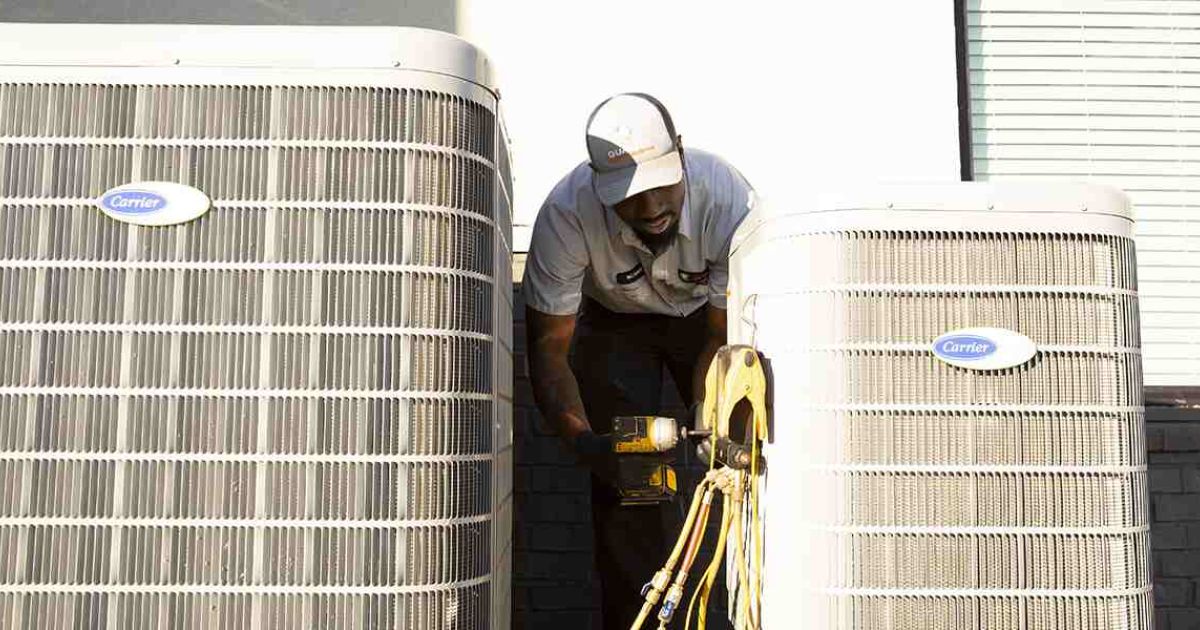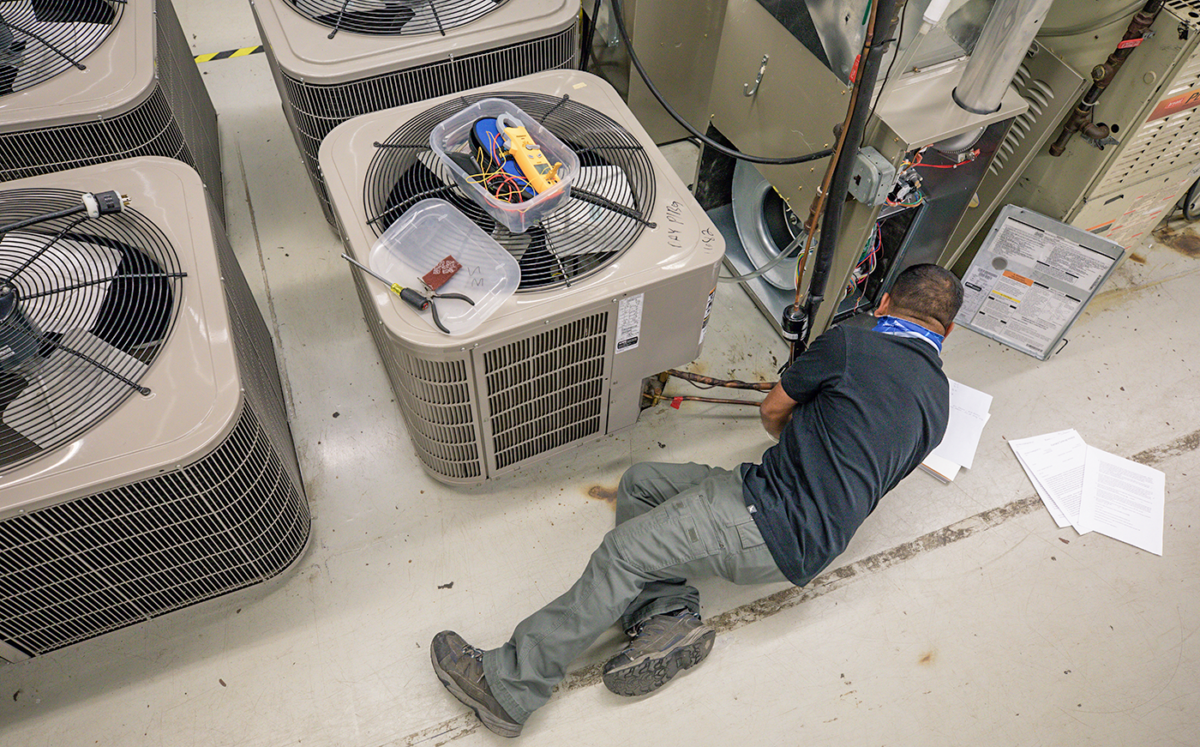Heating Contractor Specializing in Reliable Home Heating Solutions
Heating Contractor Specializing in Reliable Home Heating Solutions
Blog Article
A Comprehensive Check Out Cooling And Heating Services and Their Influence On Energy Efficiency and Cost Financial Savings
The role of cooling and heating services in improving power performance and accomplishing price financial savings is extra essential than ever, as services and homeowners look for sustainable remedies in a progressively eco-conscious globe. With technological innovations like smart thermostats and high-efficiency elements, the possibility for enhancing system efficiency is huge. Yet, truth effect of these technologies depends largely on routine maintenance and positive concern management. As we check out the complex partnership between cooling and heating systems and functional prices, including the shift towards eco-friendly options, the concern occurs: exactly how can these methods be properly implemented to make best use of both eco-friendly and financial advantages?

Significance of Cooling And Heating Equipments
heating and cooling systems are a vital part of contemporary buildings, playing an important role in preserving comfy and healthy and balanced interior atmospheres. These systems, encompassing air, ventilation, and home heating conditioning, are important for regulating temperature level, moisture, and air top quality, therefore making certain the well-being of passengers. Reliable cooling and heating systems add substantially to producing an ideal indoor climate, which is essential for both industrial and household spaces.
In business structures, HVAC systems are essential to giving a secure and productive atmosphere. By controlling interior climate problems, these systems aid prevent the development of mold and the spread of air-borne pollutants, therefore guarding the health and wellness of customers and workers. Additionally, in residential settings, HVAC systems improve living problems by providing consistent thermal comfort and boosting interior air quality, which is crucial for general health.
Additionally, the layout and upkeep of a/c systems have a straight impact on power consumption and functional prices. Correctly developed and kept systems can substantially lower energy use, causing minimized energy bills and a smaller carbon impact. The performance of these systems therefore plays a vital function in promoting sustainability and power preservation within structures, highlighting their importance in the modern building landscape.
Advances in Heating And Cooling Innovation
Technology in heating and cooling innovation is reinventing the means buildings handle indoor environments, ushering in a new era of performance and control. Current innovations have concentrated on maximizing energy intake while improving customer comfort. One noteworthy growth is the assimilation of wise thermostats, which make use of synthetic knowledge to learn tenancy patterns and readjust temperatures appropriately, lowering unneeded energy use.
Variable Cooling Agent Flow (VRF) systems stand for an additional substantial leap onward. These systems permit exact temperature control in different areas of a building, improving comfort and reducing power waste. VRF innovation is especially valuable for huge commercial areas, providing flexibility and scalability.
Furthermore, the introduction of Internet of Points (IoT) gadgets has changed HVAC systems right into interconnected networks with the ability of real-time information collection and analysis. This connection makes it possible for predictive upkeep, making sure systems operate at peak performance and reducing unanticipated downtime.
Moreover, developments in materials and design, such as making use of high-efficiency coils and compressors, have actually enhanced general system efficiency - Heating Contractor. The adoption of eco-friendly refrigerants additionally underscores the sector's commitment to sustainability
These technological developments are crucial in lowering operational costs and ecological impact, setting brand-new requirements for constructing climate administration.
Heating And Cooling Upkeep and Efficiency
Making sure optimal efficiency of cooling and heating systems prolongs beyond technological improvements; it additionally hinges on efficient upkeep methods. Routine maintenance is essential for maintaining performance, reducing power consumption, and extending the life period of HVAC systems. The main goal is to make certain that all elements work at their peak capacity, therefore reducing energy waste and preserving regular indoor convenience degrees.
Routine upkeep jobs, such as cleansing or changing air filters, examining cooling agent degrees, and examining ductwork for leakages, are essential for stopping unnecessary stress on the system. Unclean or stopped up filters can obstruct air flow, triggering the system to work more difficult and consume even more power. Similarly, poor refrigerant degrees can lower cooling down performance, resulting in greater functional expenses.
Additionally, periodic assessments by qualified professionals can recognize possible issues before they escalate into costly fixings or system failings. These inspections often consist of inspecting electrical links, calibrating thermostats, and guaranteeing the general honesty of the HVAC system. By addressing minor problems early, house owners and organizations can avoid unanticipated breakdowns and improve energy effectiveness.
Affordable Heating And Cooling Solutions
For those wanting to obtain the most out of their air, heating, and ventilation conditioning systems without breaking the financial institution, exploring affordable a/c solutions can make a considerable distinction. One instant action is to spend in programmable thermostats, which allow individuals to set specific temperature levels for various times of the day, enhancing energy use and lowering unneeded intake. By automating temperature level modifications, property owners can achieve significant savings on energy costs.
Normal upkeep is one more essential component of economical a/c monitoring. Making certain that filters are cleaned or replaced on a regular basis, ductwork is sealed, and systems are serviced by experts can avoid pricey fixings and boost system durability. Precautionary upkeep not only maintains system efficiency yet also aids in preventing unforeseen breakdowns that can bring about costly emergency repair services.
In addition, retrofitting existing systems with energy-efficient parts, such as variable rate motors or high-efficiency compressors, can be a prudent investment. These upgrades improve functional efficiency, minimize energy usage, and can often be applied at a portion of the expense of a full system substitute.
Ecological Impact Reduction
Lowering the environmental impact of HVAC systems is crucial in today's quest like this of sustainable living. HVAC systems are substantial factors to power usage, accounting for almost 40% of power usage in business buildings. This energy need often relies upon nonrenewable fuel sources, bring about greenhouse gas exhausts and environmental destruction. Transitioning to much more reliable systems, such as those using renewable resource resources, can considerably mitigate these effects.
Technical innovations in HVAC style and operation, including the integration of clever thermostats and energy-efficient heatpump, are crucial in reducing carbon impacts. These innovations permit enhanced energy use, lessening waste and improving general system performance. Furthermore, embracing routine maintenance practices makes sure cooling and heating systems operate at peak efficiency, additional stopping unneeded power usage.
In addition, the usage of eco-friendly refrigerants is critical, as typical refrigerants, find more like CFCs and HCFCs, have been phased out due to their ozone-depleting residential or commercial properties. Modern alternatives, such as hydrofluoroolefins (HFOs), deal minimized ecological dangers, straightening with global environmental protocols. By welcoming these sustainable practices, HVAC solutions can play a transformative role in reducing environmental influences, advertising energy efficiency, and cultivating a much more sustainable future.
Final Thought

In addition, the design and maintenance of HVAC systems have a straight effect on power intake and functional prices. Regular maintenance is crucial for sustaining effectiveness, minimizing energy intake, and expanding the life span of Heating and cooling systems. A/c systems are substantial factors to Source power intake, accounting for nearly 40% of energy use in industrial structures. Additionally, adopting regular maintenance practices guarantees Heating and cooling systems run at peak efficiency, further cutting unnecessary energy intake.
The transition to ecologically pleasant Cooling and heating systems further decreases functional expenses and advertises sustainability. (Heating Contractor)
Report this page